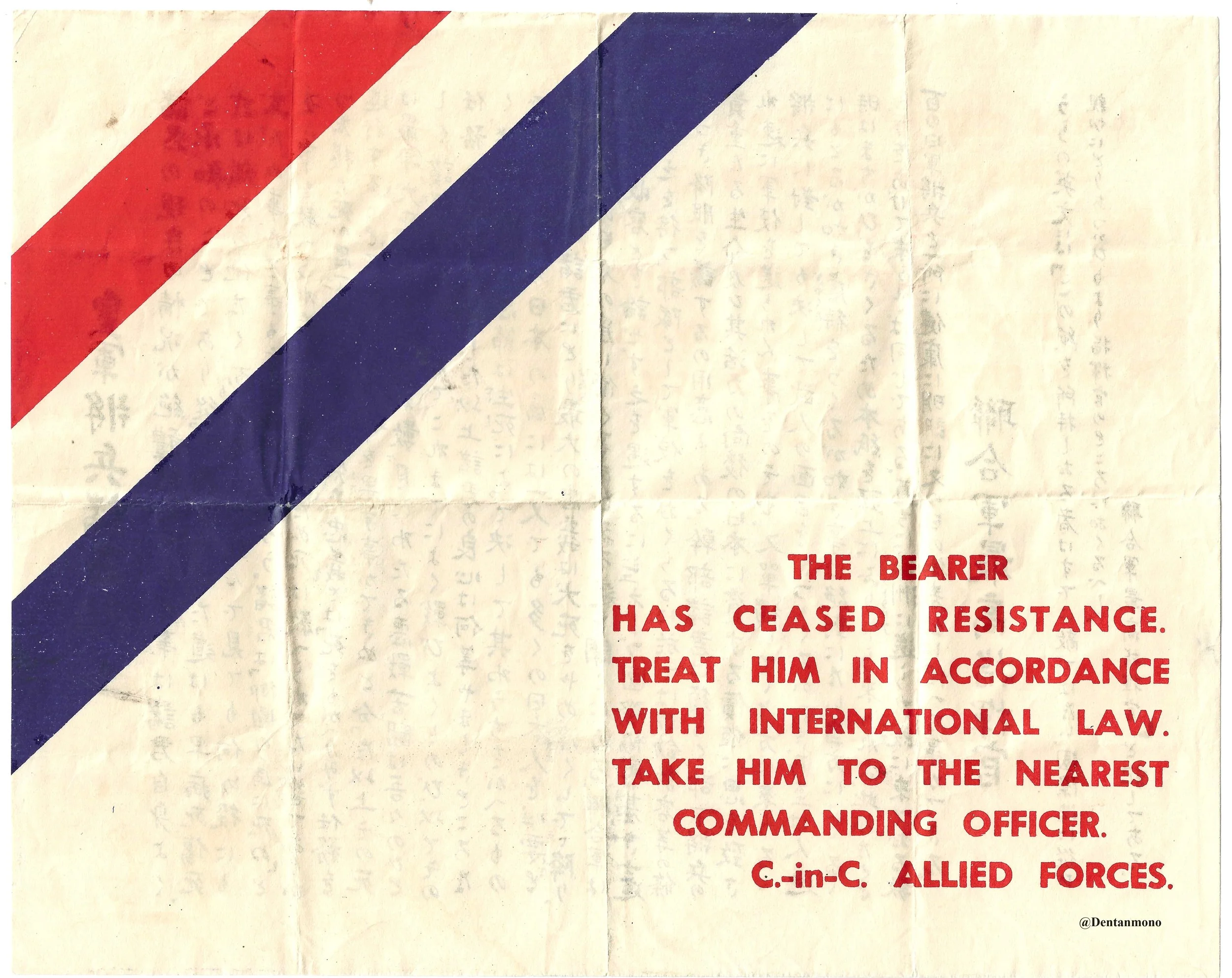J 184a
皇軍將兵諸君
Gentlemen of the Imperial Army
諸君の現在の情況が絶体絶命である事は諸君自身よくご承知のことであり従って其残された道はも早病死、傷死、或は餓死の他なく、而こうして死んで見ても何の役にも立たぬ事なる事もまたご承知だろう。
You are well aware of the desperate situation in which you find yourselves, and you are also well aware that the only options left to you are death from disease, wounds, or starvation. You know well that such a death does not improve the position of your forces.
諸君は「御国の為に死ぬ」と言う事を教へられた。しかし「役に立たぬ死」は教へられてない筈でありかつ左様な死が忠でない事もご承知だ。
You have been taught to “die for the sake of the country”. But certainly, you have neither been taught to die uselessly, nor is that true “loyalty to the country”.
忠義とは「死をもかへりみず任務を遂行する」ことで、死んでも使命を果す事ができぬと分った以上、その死は最早犬死である。
Loyalty means "to carry out one's duty even at the cost of death," and if you find that you cannot accomplish your mission even if you die, then your death is already in vain.
諸君が数ヶ月にわたる悪戦苦闘は吾々のひとしく讃嘆するところで、これまでによく戦いよくしのび、以てその任務の遂行に努力した以上諸君の良心は何等やましきところなく、諸君の今までの忠節は生死によって決して其ねうちをかへるものではない。
Your months of fierce fighting are something we all admire, and since you have fought so well and endured so much in the performance of your duties. Now that you have done your best to do your duty in such a gallant way death or life does not change the value of your loyalty.
戦後の日本の為には一人でも多くの日本人を必要とする。現在の諸君にとり最大の忠義は犬死をやめ潔くいでし降り、以て戦後の日本の為に働くが出来る道を開くにある。
Postwar Japan needs as many Japanese as possible. The greatest loyalty for you today is to stop dying in vain, descend with honor, and find a way to serve Japan in the postwar era.
連合軍は投降と収容とを論ぜずこれを遇するにジュネーブ国際協定に基き士道を以てこれを待つ。
The Allied Forces will not discuss surrender or internment, but will treat you in a manner in accordance with the Geneva Convention, and will wait for you in a dignified manner.
部隊として軍使をおくにおいては帶剱許容等の条件づき降服を議るの容易もある。
We are prepared to grant capitulation under conditions which a soldier can honorably accept, for those who surrender as a unit.
幹部諸君は須らく部下將兵の貴重たる生命及び其活力の向後の日本に資する價値に思を到される、速に軍使を送られん事をのぞむ。
We hope that commanders will consider the value of the priceless lives of the soldiers under their command and the value of their vitality to Japan in the future, and send a military envoy to them immediately.
また単独いでし当方に来られる將兵に対しても決して武人の面目を傷くるが如き、乃至は人道にもとるが如き虐待をうくるが如き事は絶対にない。
We will never harm the honor or inhumanely treat the soldiers who come to us alone.
当方にこられる時はまちがいをさくるため本紙を頭上にふり乍ら来られよ。此紙なくとも、手をあげて来られれば同じである。
When you come to us, please wave this paper above your head to avoid any confusion. Even if you do not have this paper, you can come to us by raising your hand.
直ちにオーストラリアに送られ、すでに来ておる数百の日軍將兵と一所に健康に明朗に、またの日の御奉公に備える事ができる。
You will be sent immediately to Australia to be with the hundreds of Japanese military personnel who have already arrived, in good health and good order, ready for another day's service.
連合軍最高指揮官
Supreme Commander of the Allied Forces
うらの英文には「この紙を所持しおる者はすでに敵ではない。
The English text on the other side reads, "He who possesses this paper is no longer an enemy.
国際法に従い親切にとりあっかいもより指揮官のところにおくるべし。
In accordance with international law, you should kindly take them to the commanding officer.
連合軍最高指揮官」と記してある。
Supreme Commander of the Allied Forces," states the paper.
The Japanese text has been edited. Original unedited text J184a
日本語は編集済みです。未編集のテキストは、上の文中のリーフレット番号をクリックしてください。
Australian War Memorial Database/オーストラリア戦争記念データベース
This work is licensed under CC BY-NC-SA 4.0

